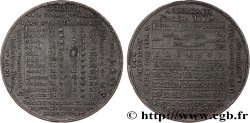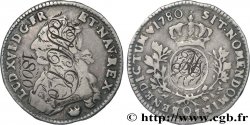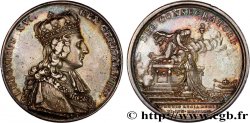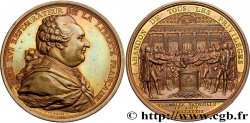Live auction - fme_958260 - LOUIS XVI Médaille, Jacques Necker, refrappe
You must signin and be an approved bidder to bid, LOGIN TO BID. Accounts are subject to approval and the approval process takes place within 48 hours. Do not wait until the day a sale closes to register. Clicking on "BID" constitutes acceptance of the terms of use of cgb.fr private live auctions.
Bids must be placed in whole Euro amounts only. The sale will start closing at the time stated on the item description; any bids received at the site after the closing time will not be executed. Transmission times may vary and bids could be rejected if you wait until the last second. For further information check the Live auction FAQ
All winning bids are subject to a 18% buyer’s fee.
All winning bids are subject to a 18% buyer’s fee.
Type : Médaille, Jacques Necker, refrappe
Date: (1789)
Metal : bronze
Diameter : 41 mm
Orientation dies : 12 h.
Engraver DUVIVIER Benjamin (1730-1819)
Weight : 34,40 g.
Edge : lisse + corne BRONZE
Puncheon : corne BRONZE
Coments on the condition:
Patine hétérogène avec quelques taches d’oxydation. Peu d’usure
Obverse
Obverse legend : JACQUES NECKER GENEVOIS - NÉ EN OCTOBRE - MDCCXXXII.
Obverse description : Buste à gauche de Jacques Necker, signé sur le tranché du bras : INSCIUM S. DU VIVIER.
Reverse
Reverse legend : VOEU PUBLIC SATISFAIT // ELEVE / AU MINISTÈRE / DES FINANCES / EN OCTOBRE 1776 / RAPPELÉ EN AOUST 1788 / ET POUR LA IIIÈME FOIS / EN JUILLET 1789 // OFFERT À LA NATION / PAR B. DUVIVIER.
Reverse description : Légende circulaire et en 7 lignes dans un couronne végétale.
Commentary
Jacques Necker (30 septembre 1732 à Genève - 9 avril 1804 à Coppet en Suisse) est un financier et homme politique genevois, ministre des Finances de Louis XVI. Il est le père de Madame de Staël.
Après avoir fait fortune comme banquier à Paris et à la suite du succès de ses essais en matière de politique économique, il est nommé par Louis XVI directeur général du Trésor royal en 1776, puis des Finances. Il modernise alors l’organisation économique du royaume en s’opposant au libéralisme de ses prédécesseurs. Renvoyé en mai 1781, peu avant les grandes spéculations boursières sous Louis XVI, il est rappelé en août 1788 avec le titre de ministre d’État du fait du soutien indéfectible de l’opinion publique, et convoque les États généraux en obtenant le doublement du tiers état. Renvoyé par Louis XVI le 8 juillet 1789 pour avoir été absent lors de la séance royale du 23 juin 1789, il retrouve sa fonction après la prise de la Bastille pour apaiser les révolutionnaires. Confronté à l'opposition de l'Assemblée nationale, il démissionne de nouveau en septembre 1790 et rédige une critique sévère du nouveau principe d'égalité.
Après avoir fait fortune comme banquier à Paris et à la suite du succès de ses essais en matière de politique économique, il est nommé par Louis XVI directeur général du Trésor royal en 1776, puis des Finances. Il modernise alors l’organisation économique du royaume en s’opposant au libéralisme de ses prédécesseurs. Renvoyé en mai 1781, peu avant les grandes spéculations boursières sous Louis XVI, il est rappelé en août 1788 avec le titre de ministre d’État du fait du soutien indéfectible de l’opinion publique, et convoque les États généraux en obtenant le doublement du tiers état. Renvoyé par Louis XVI le 8 juillet 1789 pour avoir été absent lors de la séance royale du 23 juin 1789, il retrouve sa fonction après la prise de la Bastille pour apaiser les révolutionnaires. Confronté à l'opposition de l'Assemblée nationale, il démissionne de nouveau en septembre 1790 et rédige une critique sévère du nouveau principe d'égalité.








 Live starting :
Live starting :  Report a mistake
Report a mistake Print the page
Print the page Share my selection
Share my selection Ask a question
Ask a question Consign / sell
Consign / sell
 Full data
Full data









